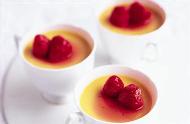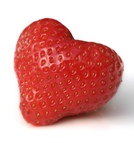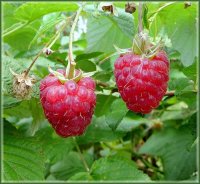Category: "Berries"
Вишня
The Russian word вишня means 'cherry'. It declines like so:
| Sg | Pl | |
| Nom | вишня | вишни |
| Acc | вишню | вишни |
| Gen | вишни | вишен |
| Pre | вишне | вишнях |
| Dat | вишне | вишням |
| Ins | вишней | вишнях |

Photo credit: Spurzem at de.wikipedia [CC-BY-SA-2.0-d], from Wikimedia Commons
In English we usually discuss cherries in the plural, but in Russia one usually discusses them with a singular noun that indicates a mass of berries, so in the following examples you will notice that the English plural always corresponds to a Russian singular.
| — Ты любишь вишню? — А кто её не любит?? |
“Do you like cherries?” “Who doesn’t??” |
| — Сколько вишни ты купила? — Полтора кило. |
“How many kilos of cherries did you buy?” “A kilo and a half.” |
| Фу, вишня протухла! | Yuck, the cherries have gone bad. |
| — Что ты делаешь? — Варю компот из вишни. — Правда? Я обожаю вишнёвый компот! |
“What are you doing?” “I’m making fresh cherry punch.” “Really? I love cherry punch!” |
In the last example we saw two ways of saying ‘cherry punch.’ The first way used a noun followed by a prepositional phrase: компот из вишни. The second turns the word вишня into the adjective вишнёвый, thus we get «вишнёвый компот».
Interestingly enough, the New Russians were known for sometimes wearing maroon-colored suits with lots of gold chains. To describe those suits the Russians often used the phrase вишнёвый костюм ‘a maroon-colored suit.’ For instance, you might hear something like this:
| — Что у тебя с лицом? — Меня вчера избил какой-то «новый русский» в вишнёвом костюме и золотых цепях. — А я думал что «новые русские» остались в девяностых, но, судя по твоему описанию, это был типичный новый русский. |
“What happened to your face?” “I got beat up by some New Russian in a maroon-suit and a bunch of gold chains.” “I had thought that the New Russians were a 90s thing, but judging by your description, that was a typical New Russian.” |
By the way, if you would like a little introduction to the generaly style of the New Russians, I recommended this page and this page.
Don's addition: Those suits were often called малиновые костюмы ‘raspberry-colored suits’ as well.
Клубника

My favorite fruit is the strawberry- клубника. When I was a very young girl in Russia, we had a neighbor who used to grow them in her yard. So my love of the red berry developed early. I will admit to being picky and preferring things with real strawberries over anything that is strawberry-(shudder)flavored.
Я обожаю клубнику.
I adore strawberries.
Notice in that sentence I am using the accusative singular to mean "strawberries." In most situations, people will assume you are speaking of more than one strawberry. The way in America when one says “strawberry pancakes,” we can be pretty sure it is not pancakes with a single berry on top. The most common words for most other berries work the same way; that is, the singular form means “berries en masse”:
У меня так много клубники, что нет места в холодильнике.
I have so many strawberries, that there is no room left in the refrigerator.
I am also quite convinced that any dessert is improved by adding strawberries to it. For example, Crème Brule with a fresh strawberry on top is heaven.
Крем-брюле лучше с клубникой.
Crème Brule is better with strawberry.

And there is nothing in the world like a fresh strawberry dipped in some high-quality dark chocolate. Yum!
Я не могу жить без клубники.
I can't live without strawberries.
| Sg | |
| Nom | клубника |
| Acc | клубнику |
| Gen | клубники |
| Pre | клубнике |
| Dat | клубнике |
| Ins | клубникой |

Don comments: As mentioned above, most berry words in Russian are singular words that encompass quantities of the berries; i.e., they are singularia tantum like the word ‘money.’ Such words induce singular verb and adjectival agreement, and they generally cannot be used with cardinal numbers. In other words, just as in English you cannot say “one money” or “two moneys,” so in Russian you are not supposed to say «одна клубника» or «две клубники» in the sense of “one strawberry” or “two strawberries.” (Some people still do say it, though.)
Amazingly enough, conversational Russian has a couple of other words that mean “a single berry of the type клубника,” and they are клубничка and клубничина. Thus one can say одна клубничина, две клубничины, одна клубничка, две клубнички.
Малина

The Russian word for raspberry is малина. Raspberries are commonly used in Russia to treat sick throats and fevers during the chilly months of winter when colds are very common. As a little girl, I caught colds often and my grandmother made me hot black tea and added fresh raspberries to calm my throat. Sometimes she would add raspberry jam right into my tea which gave it a fruity sweetness. When I lay sick in my bed, my grandmother would come to me and say «ты хочешь чай с малиной?» meaning, “would you like some tea with raspberries?”
If I had one raspberry, I would say «у меня одна малина» "I have one raspberry". However, if I have more than one raspberry, I would use the plural term for raspberry (малины) and say «у меня две малины» "I have two raspberries".
Клубника
The Russian word for strawberry is клубника. Another word for strawberry is земляника. Земляника grows in forests and is smaller in size than a store-bought strawberry but it still has the same taste and texture. As a child, I enjoyed picking strawberries with my grandmother and parents. We took large baskets with us and spent many hours picking strawberries and enjoying ourselves. At the end of the day, we walked home with baskets full of strawberries and at home my family used some of these strawberries to make strawberry jam.
Today, I tell everyone «Я любила делать варенье из земляники» “I loved making jam out of strawberries.” I enjoy shopping for strawberries today because it brings back memories of me picking strawberries with my family.
